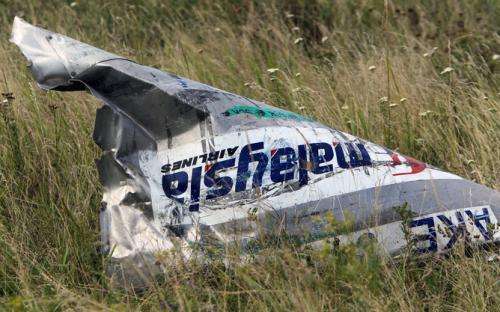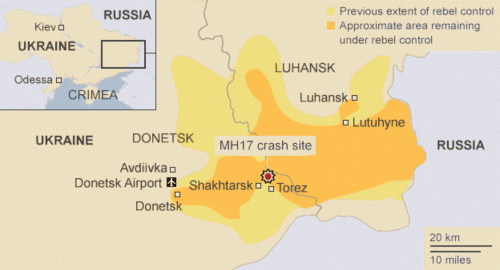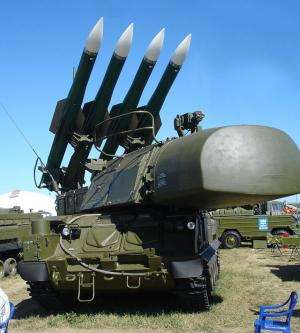Here's how you find out who shot down MH17

More than a month has passed since Malaysia Airlines flight MH17 crashed with the loss of all 298 lives on board. But despite the disturbances at the crash site near the small town of Grabovo, near Donetsk in eastern Ukraine, it is still possible to piece together what happened.
In the immediate aftermath it was reported that the aircraft had been shot down by a surface-to-air missile. Shortly after the crash Igor Girkin, leader of the separatists, took credit for the incident, claiming his troops had shot down what was assumed to be a Ukranian military transport. After learning it was a civilian airliner he later denied any involvement, claiming his forces had no weapons capable of shooting down an aircraft flying at 33,000ft, as MH17 was.
In the weeks since there have been claims and counterclaims about which side had access to one of the Buk M1 missile launchers thought to be responsible for downing the plane. It's possible to get nearer the truth of what happened to MH17 by combining evidence from four elements in play the moment the airliner came down: the air traffic control secondary radar systems that monitor the airspace over eastern Ukraine, the flight data recorder ("black box") carried by the Boeing 777 aircraft, the specification of the Buk M1 missile system, and the wreckage of MH17.
The view from air traffic control
The main source of information about aircraft for air traffic controllers is secondary surveillance radar (SSR). This is a link between an interrogator unit on the ground and a transponder on board an aircraft. The interrogator will connect to any aircraft within its range at least once every four seconds. The aircraft responds with flight information, such as the aircraft's identification, position coordinates, course, and height.
This information is processed, and correlated with the results of any primary surveillance radar – the objects detected by beaming out radio waves and recording what is reflected back by solid objects.
This is displayed to the en-route controller, in this case the staff monitoring Dnipropetrovsk flight information region eastbound, in Ukrainian government-controlled territory. This system will be able to locate a flight's position to within 500 metres, given (in this case) MH17's cruising speed of around 600 knots. All this coordinate tracking data will be recorded and stored for investigation purposes. It is highly unlikely that it could have been tampered with.

Data within the black box
A flight data recorder (FDR), commonly referred to as the black box, records all instructions sent to any electronic systems on the aircraft. It records flight characteristics such as altitude, speed, commands sent to the engines or control surfaces of the plane such as the rudder, ailerons and flaps, and streams of data from many sensors and on-board computers, including GPS coordinates accurate to within 10 metres.
Usually mounted in the aircraft's tail section where it is more likely to survive a crash, the recorder is updated several times a second throughout the flight. This information is crucial for accident investigations and to determine safety issues.
It would be virtually impossible to tamper with the FDR data as it is encoded, and follows a given sequence using set patterns that would reveal any attempt to alter it. Using the black box data it will be possible to pinpoint the coordinates of MH17 when it suffered the catastrophic event to within ten metres, and to demonstrate that this was not caused by any mechanical or electrical failure, or pilot error.
The missile system
Intelligence reports have indicated that the missile that brought down MH17 was a Russian Buk M1 Self Propelled Air Defence System, also known by its NATO reporting name of SA-11 "Gadfly". Introduced in 1979, its latest updated version is known as the SA-17 "Grizzly". Both are used by Russia, most of the ex-Warsaw Pact countries, and other nations to which Russia exports weapons.
The SA-11/SA-17 is mounted on tracked vehicles, making it easy to move. Importantly its radar is capable of IFF – that is, identifying an aircraft as friend or foe, or whether it is a commercial – using the same secondary radar transponder as air traffic control. However, the designers also implemented a backup mode that allows missile targeting to operate autonomously, bypassing the IFF safety feature. Used like this, the radar will show all targets in range. In this case, the operator selects one just presses the fire button. Only very basic training is required to operate the system like this.
The missile has a range of 42km (26 miles) and an operational ceiling of 25km (82,000ft). With a speed of 850 metres/sec (1,900mph), the missile could reach MH17 from launch in 11.5 seconds. The warhead is fitted with a proximity fuse which activates 100-300ft (30-90 metres) from its target. This fires a fragmentation charge which results in thousands of pieces of shrapnel accelerating in an spread pattern. The SA-11 is reputed to have a kill rate of 95%, so it is more than capable of downing MH17 even with virtually untrained operators.

The story told by the wreckage
The crash site covers an area of around 20 square kilometres near Grabovo, although larger parts of the aircraft are found in a much smaller area. There is little argument that the plane was shot down, so the investigation will focus on the shrapnel damage. By examining the position and angle of holes in the aircraft's fuselage it will be possible to tell the approximate direction and angle from which the missile hit the airliner. With this information, investigators will be able to trace the reverse trajectory to locate the missile's point of launch to within 100 metres.
Chemical residues on pieces of shrapnel found among the wreckage will confirm whether the warhead was a SA-11/SA-17 missile. And metallurgy analysis of the shrapnel may even yield important information on the specific production batch – does it match the batch of systems supplied to Ukraine, or is it from another unknown batch, potentially from Russia?
Assembling the Evidence
So pull all the evidence together – what do you have?
- The data from air traffic control's secondary surveillance radar provides MH17's course and coordinates to within 500 metres.
- The flight data recorder can show whether or not a component or systems failure, or pilot error that caused the loss, and can pinpoint the aircraft's position even more accurately.
- The specifications of the SA-11/SA-17 missile launcher demonstrates that it is quite capable of destroying an airliner, and that it can if necessary be operated by an inexperienced team, without the safety of an IFF-capable radar.
- Evidence gathered from the wreckage will be able confirm whether the missile was an SA-11/SA-17, and help pinpoint the location of the missile when it was fired, and perhaps even confirm if the system was exported abroad or produced for Russian use.
The evidence is there to be found, and once all of it is available, it will provide a compelling case against whoever fired upon and brought down flight MH17.
Source: The Conversation
This story is published courtesy of The Conversation (under Creative Commons-Attribution/No derivatives).
![]()




















